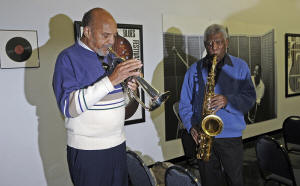Gene Barge, renowned sax man and producer known as 'Daddy G,' dies at 98
 Send a link to a friend
Send a link to a friend
 [February 05, 2025]
By HILLEL ITALIE [February 05, 2025]
By HILLEL ITALIE
NEW YORK (AP) — Gene “Daddy G” Barge, an admired and durable saxophone
player, songwriter and producer who worked on hits by Natalie Cole,
oversaw recordings by Muddy Waters, performed with the Rolling Stones
and helped inspire the dance classic “Quarter to Three,” has died. He
was 98.
He died in his sleep Sunday at his home in Chicago, according to
daughter Gina Barge.
Barge’s career spanned much of the post-World War II era. He was in
college jazz combos in the 1940s, backed Little Richard and James Brown
when they were starting out, played a long, sweet solo on the ’50s
standard “C.C. Rider” and collaborated with Gary “U.S.” Bonds on
“Quarter to Three” and other ’60s party favorites. He later recorded
with such blues greats as Waters, Buddy Guy and Willie Dixon,
co-produced Cole’s Grammy Award-winning single “Sophisticated Lady,”
toured with the Stones in the early 1980s and even played on Public
Enemy’s “New Whirl Odor” album, for which he was credited as “the
legendary Mr. Gene Barge.”
Often cited as a precursor to the E Street Band's Clarence Clemons, he
held rare status among saxophonists — so well known for a time that he
was called out by name on two hits of the early ’60s — “Quarter to
Three” and the uptempo doo-wop number “Bristol Stomp,” in which the
Dovells sing: “It started in Bristol at a dee jay hop/They hollered and
whistled never wanted to stop/We pony and twisted and we rocked with
Daddy G.”

In the 1970s and after, he had success as a character actor in thrillers
and crime stories, his films including “Above the Law,” “The Package”
and “The Fugitive.” Barge was also a consultant for Martin Scorsese’s
documentary “The Blues.”
When the musician was in his 80s, Public Enemy’s Chuck D called him “the
flyest octogenarian I know.”
The eldest of eight children, James Gene Barge was born and raised in
Norfolk, Virginia, and dreamed of professional football before playing
clarinet with his high school marching band inspired him to try music.
He took up the tenor saxophone shortly after ending a two-year stint in
the Air Force and right before enrolling in West Virginia State College:
His father, a welder in the Norfolk Navy Yard, had been given one by a
visiting British World War II soldier.
“The saxophone was the instrument, coming up, that had the sound closest
to the human voice,” Barge told Virginia Living in 2007. “It was the one
with the impact. It was the featured instrument in the band, so that was
the one you wanted to play.”
By the 1950s, Barge was jamming with local jazz and rhythm and blues
groups and leading the Gene Barge Band. The release of his instrumental
“Country,” a minor hit in 1955, helped bring on a bigger commercial
breakthrough.
Rhythm and blues singer Chuck Willis invited him to join his touring
band and brought him to a recording session for Atlantic Records in New
York. Willis was recording the sinuous “C.C. Rider,” which topped the
R&B charts in 1957 and was covered by Elvis Presley, the Grateful Dead
and many others. The studio saxophone player wasn’t working out, so
Barge stepped in.
“They did 27 takes and weren’t satisfied. So Chuck said, ‘Look, why
don’t you just let Gene run down one to get the feel,’” he told Virginia
Living. “So I ran down one and they said, ‘Hold on, that’s it, you got
it. Let’s cut it.’ ... And two or three takes later, man, we had cut the
song.”
[to top of second column]
|

Trumpeter Art Hoyle, left, and saxophonist Gene Barge demonstrate
the sounds of their instruments at Chess Recording Studio, on South
Michigan Avenue, Thursday, Oct. 27, 2011, in Chicago. (John J.
Kim/Chicago Sun-Times via AP)
 Barge had even greater success a few
years later. He had returned to Norfolk, working with a Legrand
label owner Frank Guida and forming the Church Street Five, named
for a major city roadway. The Church Street musicians would cut an
instrumental, “A Night With Daddy G,” that was the basis of “Quarter
to Three” and led to Barge’s professional nickname.
“Daddy G” originally referred to a local preacher, Bishop “Daddy”
Grace, one of whose churches was near Legrand and the site for local
shows that included members of the Church Street Five. "A Night With
Daddy G” was a driving dance track led by Barge’s hot tenor sax and
influenced by New Orleans rhythm and blues. Bonds, a fellow Legrand
artist and childhood friend of Barge’s, loved the song. But he
thought it needed lyrics, writing in his memoir “By U.S. Bonds” that
it lacked a “catchy phrase that makes you anticipate the entire
melody.”
“The players were setting up and they started playing ‘A Night With
Daddy G,’” Bonds wrote of the studio session, “and I started singing
some nonsense and it occurred to me that maybe I could add some
words.”
“Quarter to Three,” a No. 1 hit in 1961, became a rock standard and
a featured part of Bruce Springsteen’s concerts. Now known to many
as “Daddy G,” Barge would collaborate on other hits with Bonds,
including “School Is Out” and “Dear Lady Twist,” and work with a
wide range of artists over the following decades.
With Chicago’s Chess Records, he played on such hits as Fontella
Bass’ “Rescue Me” and produced albums by Waters and Little Milton
among others. With Stax Records in Memphis, Tennessee, he arranged
the gospel favorites “Lord Don’t Move the Mountain,” by Inez
Andrews, and the Beautiful Zion Baptist Church’s “I’ll Make It
Alright.”
Barge’s Chicago connection helped lead to his work with Natalie
Cole, daughter of Nat “King” Cole. He befriended the
writing-producing team of Chuck Jackson and Marvin Yancey and helped
produce and arrange the 1970s albums “Natalie” and “Unpredictable”
among others. In a 2023 podcast with his daughter Gina, Barge
remembered the late singer as “one of the most talented” performers
he worked with and most intelligent, “very knowledgeable” about the
music business in part because of her father.

Barge’s own album, “Dance With Daddy G,” came out in 1965. More
recently, he self-released “Olio,” which included cameos from
bluesman Buddy Guy and soul star Otis Clay, and he was on stage
often as a member of the Chicago Rhythm and Blues Kings.
“I’m sitting here looking at my horn now, feeling guilty because I
didn’t get enough practice time in today — I’m mad because I didn’t
write a song, or the intro to a song. I got things to do. I’m not
looking back,” Barge told Virginia Living. “My philosophy is that
you’ve got to move forward, stay contemporary, read, keep up with
the young people. Because that’s the future.”
All contents © copyright 2025 Associated Press. All rights reserved |